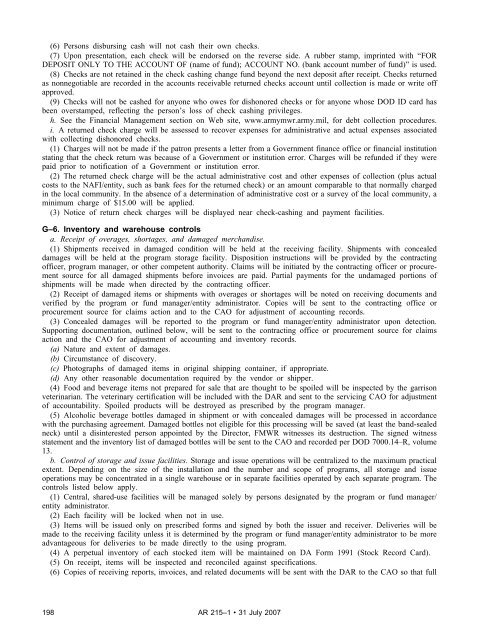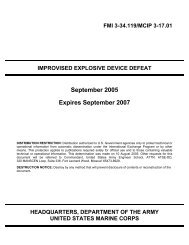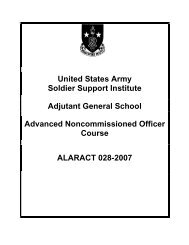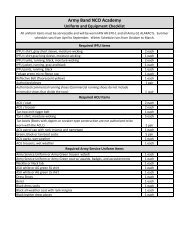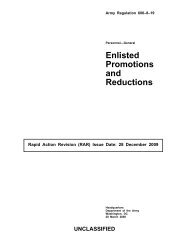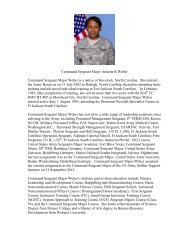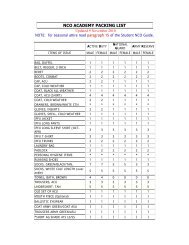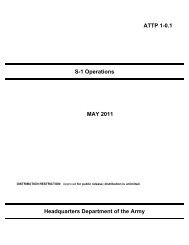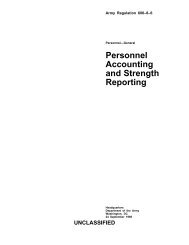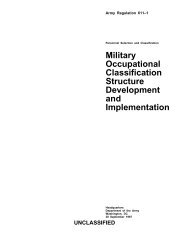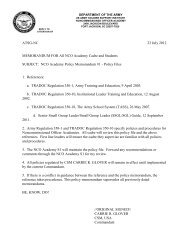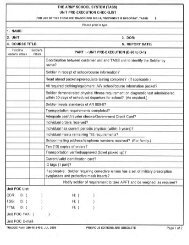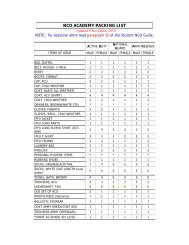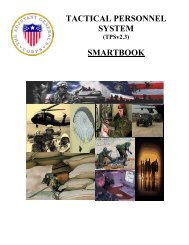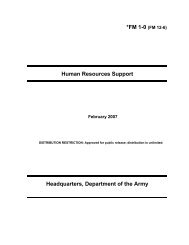AR 215-1 - Soldier Support Institute - U.S. Army
AR 215-1 - Soldier Support Institute - U.S. Army
AR 215-1 - Soldier Support Institute - U.S. Army
Create successful ePaper yourself
Turn your PDF publications into a flip-book with our unique Google optimized e-Paper software.
(6) Persons disbursing cash will not cash their own checks.<br />
(7) Upon presentation, each check will be endorsed on the reverse side. A rubber stamp, imprinted with “FOR<br />
DEPOSIT ONLY TO THE ACCOUNT OF (name of fund); ACCOUNT NO. (bank account number of fund)” is used.<br />
(8) Checks are not retained in the check cashing change fund beyond the next deposit after receipt. Checks returned<br />
as nonnegotiable are recorded in the accounts receivable returned checks account until collection is made or write off<br />
approved.<br />
(9) Checks will not be cashed for anyone who owes for dishonored checks or for anyone whose DOD ID card has<br />
been overstamped, reflecting the person’s loss of check cashing privileges.<br />
h. See the Financial Management section on Web site, www.armymwr.army.mil, for debt collection procedures.<br />
i. A returned check charge will be assessed to recover expenses for administrative and actual expenses associated<br />
with collecting dishonored checks.<br />
(1) Charges will not be made if the patron presents a letter from a Government finance office or financial institution<br />
stating that the check return was because of a Government or institution error. Charges will be refunded if they were<br />
paid prior to notification of a Government or institution error.<br />
(2) The returned check charge will be the actual administrative cost and other expenses of collection (plus actual<br />
costs to the NAFI/entity, such as bank fees for the returned check) or an amount comparable to that normally charged<br />
in the local community. In the absence of a determination of administrative cost or a survey of the local community, a<br />
minimum charge of $15.00 will be applied.<br />
(3) Notice of return check charges will be displayed near check-cashing and payment facilities.<br />
G–6. Inventory and warehouse controls<br />
a. Receipt of overages, shortages, and damaged merchandise.<br />
(1) Shipments received in damaged condition will be held at the receiving facility. Shipments with concealed<br />
damages will be held at the program storage facility. Disposition instructions will be provided by the contracting<br />
officer, program manager, or other competent authority. Claims will be initiated by the contracting officer or procurement<br />
source for all damaged shipments before invoices are paid. Partial payments for the undamaged portions of<br />
shipments will be made when directed by the contracting officer.<br />
(2) Receipt of damaged items or shipments with overages or shortages will be noted on receiving documents and<br />
verified by the program or fund manager/entity administrator. Copies will be sent to the contracting office or<br />
procurement source for claims action and to the CAO for adjustment of accounting records.<br />
(3) Concealed damages will be reported to the program or fund manager/entity administrator upon detection.<br />
<strong>Support</strong>ing documentation, outlined below, will be sent to the contracting office or procurement source for claims<br />
action and the CAO for adjustment of accounting and inventory records.<br />
(a) Nature and extent of damages.<br />
(b) Circumstance of discovery.<br />
(c) Photographs of damaged items in original shipping container, if appropriate.<br />
(d) Any other reasonable documentation required by the vendor or shipper.<br />
(4) Food and beverage items not prepared for sale that are thought to be spoiled will be inspected by the garrison<br />
veterinarian. The veterinary certification will be included with the D<strong>AR</strong> and sent to the servicing CAO for adjustment<br />
of accountability. Spoiled products will be destroyed as prescribed by the program manager.<br />
(5) Alcoholic beverage bottles damaged in shipment or with concealed damages will be processed in accordance<br />
with the purchasing agreement. Damaged bottles not eligible for this processing will be saved (at least the band-sealed<br />
neck) until a disinterested person appointed by the Director, FMWR witnesses its destruction. The signed witness<br />
statement and the inventory list of damaged bottles will be sent to the CAO and recorded per DOD 7000.14–R, volume<br />
13.<br />
b. Control of storage and issue facilities. Storage and issue operations will be centralized to the maximum practical<br />
extent. Depending on the size of the installation and the number and scope of programs, all storage and issue<br />
operations may be concentrated in a single warehouse or in separate facilities operated by each separate program. The<br />
controls listed below apply.<br />
(1) Central, shared-use facilities will be managed solely by persons designated by the program or fund manager/<br />
entity administrator.<br />
(2) Each facility will be locked when not in use.<br />
(3) Items will be issued only on prescribed forms and signed by both the issuer and receiver. Deliveries will be<br />
made to the receiving facility unless it is determined by the program or fund manager/entity administrator to be more<br />
advantageous for deliveries to be made directly to the using program.<br />
(4) A perpetual inventory of each stocked item will be maintained on DA Form 1991 (Stock Record Card).<br />
(5) On receipt, items will be inspected and reconciled against specifications.<br />
(6) Copies of receiving reports, invoices, and related documents will be sent with the D<strong>AR</strong> to the CAO so that full<br />
198 <strong>AR</strong> <strong>215</strong>–1 • 31 July 2007


